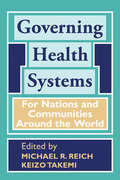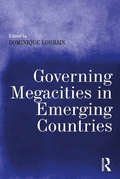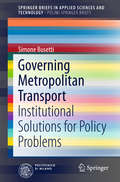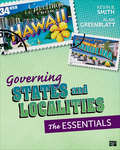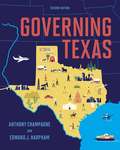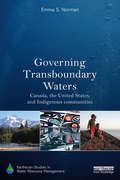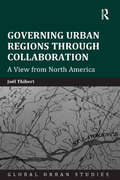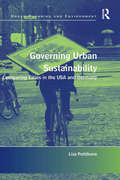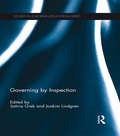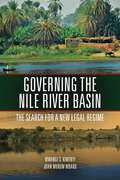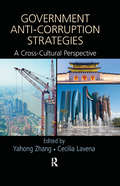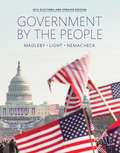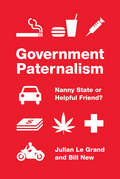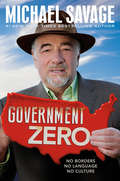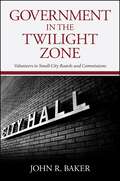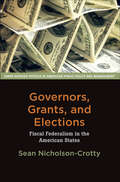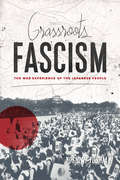- Table View
- List View
Governing Climate Change (Global Institutions)
by Harriet Bulkeley Peter NewellGoverning Climate Change, Second Edition, provides a short and accessible introduction to how climate change is governed by an increasingly diverse range of actors, from civil society and market actors to multilateral development banks, donors, and cities. This updated edition also includes: up-to-date coverage of the negotiations post-Copenhagen (Cancun, Durban, and towards Paris) and some of the shifts in the inter-governmental politics; a deeper discussion of the roles of actors that have come to prominence in the climate negotiations; an overview of the key funding mechanisms such as the Green Climate Fund, Adaptation Fund, the High-Level Advisory Group on Climate Change Finance, and REDD (Reducing Emissions from Deforestation and forest Degradation); a direct assessment of what the proliferation of TCCG (Transnational Climate Change Governance) adds up to in terms of legitimacy, effectiveness etc., drawing on all the recent research in this area; an analysis of renewable energy in the UK (in the light of recent controversies around the siting of wind turbines and fracking projects). Providing an interdisciplinary perspective drawing on geography, politics, international relations, and development studies, this book is essential reading for students and scholars concerned not only with the climate governance but with the future of the environment in general.
Governing Europe's Marine Environment: Europeanization of Regional Seas or Regionalization of EU Policies? (Corbett Centre for Maritime Policy Studies Series)
by Michael GilekGoverning Europe's Marine Environment is a coherent up-to-date multidisciplinary analysis of current approaches and challenges to the sustainable governance of Europe's marine environment. Structured in three parts, Part 1 outlines general theoretical ideas about governance, governing, and governability and serves as a starting point for analysing the development of marine governance in Europe from the perspective of different disciplines. Part 2 includes studies of EU marine governance. Part 3 focuses on Europe's regional seas, namely the Baltic Sea, the North Sea, the Black Sea, and the Mediterranean Sea. This book presents a better understanding of the fragmented governance of marine governance in Europe and in particular the tension between the Europeanization of regional seas and the regionalization of EU policies.
Governing Health Systems: For Nations and Communities Around the World
by Michael Reich Keizo TakemiGoverning Health Systems: For Nations and Communities Around the World examines the complex relationships between governance and performance in community and national health systems. Each chapter provides an in-depth case study, using both qualitative and quantitative methods, on health systems in many countries, including Uganda, Ghana, India, Zambia, Japan, Nigeria, Indonesia, Brazil, Palestine, and South Korea. The chapters were written by former Takemi Fellows, who were mid-career research fellows at the Harvard School of Public Health, and their colleagues. This case study approach yields important findings as well as contextual insights about the challenges and accomplishments in addressing governance issues in national and community health systems around the world. Health policymakers around the world are struggling to address the multiple challenges of governing health systems. These challenges also represent important themes for the research mission of the Takemi Program in International Health at the Harvard School of Public Health. This book is based on the program's thirtieth anniversary symposium held in October 2013 at Harvard. The studies presented in this book--deep examinations of illustrative examples of health system governance for communities and nations--contribute to our knowledge about global health and assist policymakers in dealing with the complex practical problems of health systems. In short, this book addresses central questions about governing health systems--and why governance matters.
Governing Megacities in Emerging Countries
by Dominique LorrainMegacities are a new phenomenon in history. The fact that many of them are in emerging countries deepens the challenges of governing these spaces. Can these vast, complex entities, rife with inequalities and divisions, be governed effectively? For researchers, the answer has often been no. The approach developed in this work focuses on the material city and its institutions and shows that, without recourse to a big new theory, urban leaders have devised mechanisms of ordinary government. They have done so through the resolution of practical and essential problems: providing electricity, drinking water, sanitation, transportation. Three findings emerge from this book. Infrastructure networks help to structure cities and function as mechanisms of cohesion. Megacities become more governable if there is a legitimate authority capable of making choices. Finally, anarchic urbanisation has its roots in systems of land ownership, in inadequate urban planning and in the practices of developers and local actors. In the originality of its hypotheses and the precision of the analyses carried out in the four case study cities of Shanghai, Mumbai, Cape Town and Santiago de Chile, this work is addressed to all those interested in the life of cities: politicians, local and central government officials, executives in urban companies, researchers and students.
Governing Metropolitan Transport
by Simone BusettiThis book investigates the link between institutions and public policies with specific reference to transport. It opens by examining the main arguments for the establishment of metropolitan transport authorities. The potential impacts of institutional change on the policy efficiency of institutions are then examined. Key problems for institutional designers are identified, showing how they can hamper the achievement of desired policy outcomes through institutional solutions. Two in-depth case studies on institutional change in metropolitan transport (in London and Barcelona) are presented with a view to testing the aforementioned hypotheses and providing insights into the ways in which the two transport institutions were reformed. The concluding chapter identifies lessons for institutional designers and highlights the policy results that may be expected from the constitution of metropolitan transport authorities.
Governing States and Localities: The Essentials
by Kevin B. Smith Alan Howard GreenblattIn this Essentials Edition of Governing States and Localities, authors Kevin Smith and Alan Greenblatt retain the hallmarks of their bestselling introductory text by blending the latest scholarship with engaging journalistic writing, crisp storytelling, and class-tested pedagogy. Based on market feedback, the authors distilled core topics and cut out policy coverage some instructors do not have time to cover, but kept the ever-important finance chapter and a beautiful full-color interior design. This value-priced, ten-chapter text utilizes the comparative approach to ensure that students walk away from the course understanding how and why states and localities are both similar and different in institutional structure, culture, history, geography, economy, and demographics
Governing Texas (Second edition)
by Anthony Champagne Edward J. HarphamGoverning Texas, Second Edition, offers extensive, easy-to-use tools to help students understand the basics of Texas politics and compare Texas to other states, and to help instructors assess students on state-mandated learning outcomes.
Governing Transboundary Waters: Canada, the United States, and Indigenous Communities (Earthscan Studies in Water Resource Management)
by Emma S. NormanWinner of the Political Geography Specialty Group's 2015 Julian Minghi Distinguished Book Award! With almost the entire world’s water basins crossing political borders of some kind, understanding how to cooperate with one’s neighbor is of global relevance. For Indigenous communities, whose traditional homelands may predate and challenge the current borders, and whose relationship to water sources are linked to the protection of traditional lifeways (or ‘ways of life’), transboundary water governance is deeply political. This book explores the nuances of transboundary water governance through an in-depth examination of the Canada-US border, with an emphasis on the leadership of Indigenous actors (First Nations and Native Americans). The inclusion of this "third sovereign" in the discussion of Canada-U.S. relations provides an important avenue to challenge borders as fixed, both in terms of natural resource governance and citizenship, and highlights the role of non-state actors in charting new territory in water governance. The volume widens the conversation to provide a rich analysis of the cultural politics of transboundary water governance. In this context, the book explores the issue of what makes a good up-stream neighbor and analyzes the rescaling of transboundary water governance. Through narrative, the book explores how these governance mechanisms are linked to wider issues of environmental justice, decolonization, and self-determination. To highlight the changing patterns of water governance, it focuses on six case studies that grapple with transboundary water issues at different scales and with different constructions of border politics, from the Pacific coastline to the Great Lakes.
Governing Urban Regions Through Collaboration: A View from North America (Global Urban Studies)
by Joël ThibertWith the demise of the Old Regionalist project of achieving good regional governance through amalgamation, voluntary collaboration has become the modus operandi of a large number of North American metropolitan regions. Although many researchers have become interested in regional collaboration and its determinants, few have specifically studied its outcomes. This book contributes to filling this gap by critically re-evaluating the fundamental premise of the New Regionalism, which is that regional problems can be solved without regional/higher government. In particular, this research asks: to what extent does regional collaboration have a significant independent influence on the determinants of regional resilience? Using a comparative (Canada-U.S.) mixed-method approach, with detailed case studies of the San Francisco Bay Area, the Greater Montreal and trans-national Niagara-Buffalo regions, the book examines the direct and indirect impacts of inter-local collaboration on policy and policy outcomes at the regional and State/Provincial levels. The book research concentrates on the effects of bottom-up, state-mandated and functional collaboration and the moderating role of regional awareness, higher governmental initiative and civic capital on three outcomes: environmental preservation, socio-economic integration and economic competitiveness. In short, the book seeks to highlight those conditions that favor collaboration and might help avoid the collaborative trap of collaboration for its own sake. More specifically, this research concentrates on the effect of bottom-up, state-mandated and functional collaboration, the moderating role of regional awareness, governmental initiative and civic capital on environmental preservation, socio-economic integration and economic competitiveness. In short, the book seeks to understand whether and how urban regional collaboration contributes to regional resilience.
Governing Urban Sustainability: Comparing Cities in the USA and Germany
by Lisa PettiboneIn her study of the interactions between tools of urban sustainability governance in key cities, Lisa Pettibone argues that a new factor-sustainability-minded groups-may be critical to building momentum for sustainability. The book presents in-depth case studies of six cities in the USA and Germany: New York, Portland, Seattle, Berlin, Hamburg, and Heidelburg. Drawing on 75 interviews, document analysis, and a bilingual literature review, the book analyzes how sustainability is politically constructed in city strategic plans and sustainability indicators. The volume provides a comprehensive introduction to the principles of sustainability, discusses the key governance instruments relevant to urban sustainability, and delivers new empirical and theoretical material on their role in a sustainability transition. It concludes that despite the national-level differences, cities’ experiences in both countries are similar. Political sustainability at the city level differs in several important ways from academic principles of sustainability. Finally, it proposes that sustainability-minded groups may be a key link to connect urban sustainability in practice to theoretical concepts.
Governing by Inspection (Studies in European Education)
by Sotiria Grek Joakim LindgrenIn recent decades, governing practices in education have become highly contradictory: deregulation and decentralisation are accompanied by re-regulation and increased centralisation, contributing to considerable governing tensions in and across different national systems and within the emergent European education policy space. On the one hand there is the persistence of performance monitoring through target-setting, indicators and benchmarks, and on the other, the promotion of self-evaluation and ‘light touch’ regulation that express a ‘softer’ governance turn, and promote self-regulation as the best basis for constant improvement. Drawing on research undertaken into three national systems, this edited volume explores the attempts to manage these tensions in Europe through the development of inspection as a governing practice. Inspectorates and inspectors offer key locations for the exploration of governing tensions, positioned as they are between the international, the national, and the local and institutional, and with responsibility for both regulation and development. All three national systems offer contrasting approaches to inspection, all of which have changed considerably in recent years. Governing by Inspection positions inspection in the framework of changing education policy and politics, and in a period of intensive policy development and exchange in Europe. It will be key reading for academics, researchers and postgraduate students in the fields of education, political science and social policy.
Governing the Nile River Basin
by John Mbaku Mwangi KimenyiThe effective and efficient management of water is a major problem, not just for economic growth and development in the Nile River basin, but also for the peaceful coexistence of the millions of people who live in the region. Of critical importance to the people of this part of Africa is the reasonable, equitable and sustainable management of the waters of the Nile River and its tributaries.Written by scholars trained in economics and law, and with significant experience in African political economy, this book explores new ways to deal with conflict over the allocation of the waters of the Nile River and its tributaries. The monograph provides policymakers in the Nile River riparian states and other stakeholders with practical and effective policy options for dealing with what has become a very contentious problem--the effective management of the waters of the Nile River. The analysis is quite rigorous but also extremely accessible.
Governing the Nile River Basin
by John Mbaku Mwangi KimenyiThe effective and efficient management of water is a major problem, not just for economic growth and development in the Nile River basin, but also for the peaceful coexistence of the millions of people who live in the region. Of critical importance to the people of this part of Africa is the reasonable, equitable and sustainable management of the waters of the Nile River and its tributaries.Written by scholars trained in economics and law, and with significant experience in African political economy, this book explores new ways to deal with conflict over the allocation of the waters of the Nile River and its tributaries. The monograph provides policymakers in the Nile River riparian states and other stakeholders with practical and effective policy options for dealing with what has become a very contentious problem-the effective management of the waters of the Nile River. The analysis is quite rigorous but also extremely accessible.
Government Anti-Corruption Strategies: A Cross-Cultural Perspective
by Yahong Zhang Cecilia LavenaThis book is designed to help students, researchers, and practitioners understand public corruption and anti-corruption practices from an international perspective. It describes the problems governments face in dealing with public corruption, outlines strategies that have and have not been implemented by the government, and explains why some countries have achieved great success with handling corruption and why others still struggle to do so. It contains useful knowledge about public corruption and strategic approaches to preventing, reducing, and combating corruption.
Government Budgeting: A Practical Guidebook
by George M. GuessDirected at state and local financial managers, Government Budgeting presents, in a short and succinct manner, a sampling of the major tools used to deal with current fiscal problems. George M. Guess provides examples from a number of states and localities and explains how to use them in diverse situations. At the end of each chapter, cases, exercises and/or questions are provided for further study. The chapters cover the major topics needed by today's practitioners: core concepts and definitions of budgeting and financial management; how to analyze the revenue budget and evaluate revenue sources; how one might plan expenditures and prepare an annual request; how capital projects should (and should not) be planned, analyzed, compared, placed into a capital improvements program, and financed; and the critical topic of budget implementation. Without claiming that practical tools can resolve every problem, the book suggests that if all stakeholders used such analytic tools the outcomes might be better for the general welfare.
Government By The People 2014 Elections and Updates Edition
by Paul C. Light David B. Magleby Christine L. NemacheckThroughout, authors David Magleby, Paul Light, and Christine Nemacheck highlight the central role that people play in a constitutional democracy, inspiring students to see how similarities and differences in political beliefs continue to shape government to this day. The 2014 Elections and Updates Edition includes coverage of the major issues in today's headlines to engage students in learning, as well as to boost the relevance of course material to students' lives.
Government Paternalism
by Julian Le Grand Bill NewShould governments save people from themselves? Do governments have the right to influence citizens' behavior related to smoking tobacco, eating too much, not saving enough, drinking alcohol, or taking marijuana--or does this create a nanny state, leading to infantilization, demotivation, and breaches in individual autonomy? Looking at examples from both sides of the Atlantic and around the world, Government Paternalism examines the justifications for, and the prevalence of, government involvement and considers when intervention might or might not be acceptable. Building on developments in philosophy, behavioral economics, and psychology, Julian Le Grand and Bill New explore the roles, boundaries, and responsibilities of the government and its citizens.Le Grand and New investigate specific policy areas, including smoking, saving for pensions, and assisted suicide. They discuss legal restrictions on risky behavior, taxation of harmful activities, and subsidies for beneficial activities. And they pay particular attention to "nudge" or libertarian paternalist proposals that try to change the context in which individuals make decisions so that they make the right ones. Le Grand and New argue that individuals often display "reasoning failure": an inability to achieve the ends that they set themselves. Such instances are ideal for paternalistic interventions--for though such interventions might impinge on autonomy, the impact can be outweighed by an improvement in well-being.Government Paternalism rigorously considers whether the state should guide citizen decision making in positive ways and if so, how this should be achieved.
Government Zero: No Borders, No Language, No Culture
by Michael SavageFrom bestselling author of Stop the Coming Civil War, Michael Savage reveals the massive dangers currently leading to the demise of our government.Michael Savage has been warning Americans for decades and now it's here. In GOVERNMENT ZERO: No Borders, No Language, No Culture, Savage sounds the alarm about how progressives and radical Islamists are each unwittingly working towards similar ends: to destroy Western Civilization and remake it in their own respective images. These two dark forces are transforming our once-free republic into a socialist, Third World dictatorship ruled by Government Zero: absolute government and zero representation. Combining in-depth analysis with biting commentary, Savage cuts through mainstream media propaganda to reveal an all-out attack on our borders, language and culture by progressive travelers who have hijacked public policy from national defense to immigration to public education. Find out everything you need to know about this terrifying agenda to weaken the U.S. military, cripple the American economy, subvert basic American liberties such as freedom of speech, and destroy the international world order. There is no time to lose. The Progressive-Islamist agenda has advanced into every public space, from the White House to the military to your local public school. If America is to survive, it has to be stopped. Michael Savage has a plan. Get the inside story before it's too late.
Government by the People (AP Edition) (2014 Elections and Updates Edition) (25th Edition)
by Paul C. Light David B. Magleby Christine L. Nemacheck<p>As the title of our book suggests, we view the idea of government by the people as a defining element of American politics and government. From the Mayflower Compact to the Declaration of Independence to the expansion of rights and liberties to more and more citizens in the last century, we have expanded on the idea of self-government. Too often, Americans take their basic rights to life, liberty, and the pursuit of happiness for granted. But these rights were guaranteed neither by those who wrote our Constitution nor by the citizens who have worked, one generation after another, to expand these rights and set our government's course. Rather, government by the people today depends on citizens who are informed and involved in the decisions and processes of our constitutional democracy. <p>We have written this book with the aim of informing you about why you have a stake in our government and how you can become involved. The Framers of our Constitution warned us that we must always safeguard our rights, liberties, and political institutions. But we cannot do so without first understanding the basic rules of the game set by the Constitution. We must see the presidency, Congress, the federal bureaucracy, and the Supreme Court not as a remote "federal government" but as institutions that affect each of us every single day. Government by the people depends on people informing themselves and participating. It is not something that can be outsourced or that a generation can decide to take a pass on.</p>
Government in the Twilight Zone: Volunteers to Small-City Boards and Commissions
by John R. BakerWhile 97 percent of all American cities are smaller than 50,000 and millions of Americans experience civic life in these communities, what we know about their politics and governance is limited, particularly how local board systems operate, who the board members are, what motivates them to serve, and what they think about their experiences. Drawing on a unique and extensive set of survey data from board members, mayors, and city councilors in sixty cities across six states, Government in the Twilight Zone significantly expands our knowledge of small city boards and politics. By embedding the empirical research in the historical trajectory of small towns, John R. Baker provides a rich narrative that discusses the role of entities such as planning commissions, parks and recreation boards, and zoning appeals boards. He also clarifies how board and commission members are recruited in small cities, explains how these organizations work to make the decisions required of them, and reveals what they and their city councilors and mayors think about their importance and effectiveness.
Government of Peace: Social Governance, Security and the Problematic of Peace
by Ranabir SamaddarGovernment of Peace addresses a major question in world politics today: how does post-colonial democracy produce a form of governance that copes with conflicts, insurgencies, revolts, and acute dissents? The contributors view social governance as a crucial component in answering this question and their narratives of governance aim to show how certain appropriate governing modes make social conflicts more manageable or at least also occasions for development. They show how government often expands to cope with acute conflicts; money is made more readily available; the transfer of resources acquires frantic pace; and so society becomes more attuned to a money-centric, modern life. Yet this style of governance is not the only approach. Dialogues from below challenge this accepted path to peacebuilding and new subjectivities emerge from movements for social justice by women, migrants, farmers, dalits, low-caste, and other subaltern groups. The idea of a government of peace sits at the core of the interlinked issues of social governance, peace-building, and security. By exploring this idea and analysing the Indian experience of insurgencies and internal conflicts the contributors collectively show how rules of social governance can and have evolved.
Governors, Grants, and Elections: Fiscal Federalism in the American States (Johns Hopkins Studies in American Public Policy and Management)
by Sean Nicholson-CrottyHow partisan politics influence grant-related decisions at the state level.Each year, states receive hundreds of billions of dollars in grants-in-aid from the federal government. Gubernatorial success is often contingent upon the pursuit and allocation of these grants. In Governors, Grants, and Elections, Sean Nicholson-Crotty reveals the truth about how U.S. governors strategically utilize these funds. Far from spending federal money in apolitical ways, they usually pursue their own policy interests in the hopes of maximizing their or their party’s electoral success. Nicholson-Crotty analyzes three decades of data on the receipt and expenditure of grants in all fifty states. He also draws compelling evidence from governors’ public speeches and interviews with state officials. Ultimately, he demonstrates that incumbent governors’ use of grants to deliver policies desired by core constituents—along with their opportunistic funding of public and private goods that appeal to noncore median voters—enables them to increase approval, legislative success, and, ultimately, vote share for themselves or their parties.The inaugural book in the Johns Hopkins Studies in American Public Policy and Management series, Governors, Grants, and Elections is a significant and accessible work of public policy scholarship that sits at the nexus of multiple fields within political science.
Grand Strategy in Theory and Practice
by William C. MartelThis book explores fundamental questions about grand strategy, as it has evolved across generations and countries. It provides an overview of the ancient era of grand strategy and a detailed discussion of its philosophical, military, and economic foundations in the modern era. The author investigates these aspects through the lenses of four approaches - those of historians, social scientists, practitioners, and military strategists. The main goal is to provide contemporary policy makers and scholars with a historic and analytic framework in which to evaluate and conduct grand strategy. By providing greater analytical clarity about grand strategy and describing its nature and its utility for the state, this book presents a comprehensive theory on the practice of grand strategy in order to articulate the United States' past, present, and future purpose and position on the world stage.
Grassroots Fascism: The War Experience of the Japanese People
by Ethan Mark Yoshimi YoshiakiGrassroots Fascism profiles the Asia Pacific War (1941--1945) -- the most important though least understood experience of Japan's modern history -- through the lens of ordinary Japanese life. Moving deftly from the struggles of the home front to the occupied territories to the ravages of the front line, the book offers rare insight into popular experience from the war's troubled beginnings through Japan's disastrous defeat in 1945 and the new beginning it heralded.Yoshimi Yoshiaki mobilizes personal diaries, memoirs, and government documents to portray the ambivalent position of ordinary Japanese as both wartime victims and active participants. He also provides equally penetrating accounts of the war experience of Japan's imperial subjects, including Koreans and Taiwanese. This book challenges the idea that the Japanese operated as a passive, homogenous mass during the war -- a mere conduit for a military--imperial ideology imposed upon them by the political elite. Viewed from the bottom up, wartime Japan unfolds as a complex modern mass society, with a corresponding variety of popular roles and agendas. In chronicling the diversity of the Japanese social experience, Yoshimi's account elevates our understanding of Japan's war and "Japanese Fascism," and in its relation of World War II to the evolution -- and destruction -- of empire, it makes a fresh contribution to the global history of the war. Ethan Mark's translation supplements the Japanese original with explanatory annotations and an in-depth analytical introduction, drawing on personal interviews to situate the work within Japanese studies and global history.
Gray Sabbath: Jesus People USA, the Evangelical Left, and the Evolution of Christian Rock
by Shawn YoungFormed in 1972, Jesus People USA is an evangelical Christian community that fundamentally transformed the American Christian music industry and the practice of American evangelicalism, which continues to evolve under its influence. In this fascinating ethnographic study, Shawn David Young replays not only the growth and influence of the group over the past three decades but also the left-leaning politics it developed that continue to serve as a catalyst for change.Jesus People USA established a still-thriving Christian commune in downtown Chicago and a ground-breaking music festival that redefined the American Christian rock industry. Rather than join "establishment" evangelicalism and participate in what would become the megachurch movement, this community adopted a modified socialism and embraced forms of activism commonly associated with the New Left. Today the ideological tolerance of Jesus People USA aligns them closer to liberalism than to the religious right, and Young studies the embodiment of this liminality and its challenge to mainstream evangelical belief. He suggests the survival of this group is linked to a growing disenchantment with the separation of public and private, individual and community, and finds echoes of this postmodern faith deep within the evangelical subculture.


